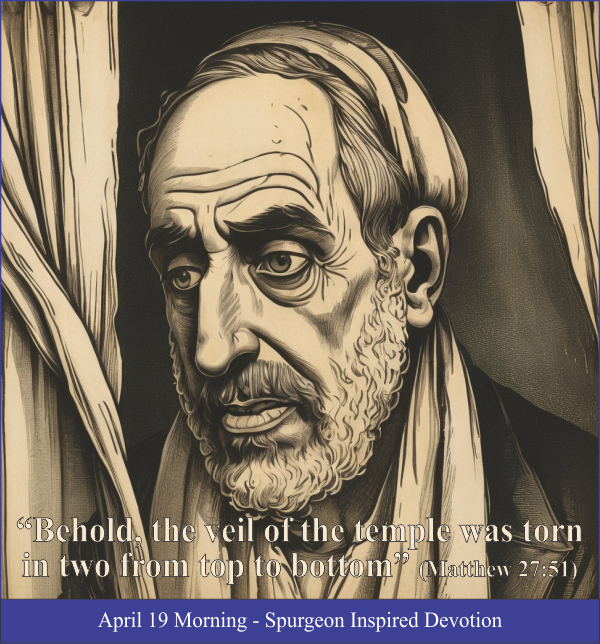
| April 19 Morning Devotion |
|
|
“Behold, the veil of the temple was torn in two from top to bottom” (Matthew 27:51) The curtain that separated the Holy of Holies from sinners was sixty feet tall, thirty feet wide and four inches thick. It had multiple layers, making it almost impossible to accidentally see behind the veil. There’s a 14th century Jewish tradition that the once-a-year visit by the High Priest on Yom Kippur could end in God killing the priest. The priest prepared for this possibility by wearing bells and a rope. If the tinkling of the bells ceased, they used the rope to drag out the body. This tradition is a profound example of the severity of the Law. If the High Priest omitted any of the cleansing ceremonies before going behind the veil, God would kill him. But Christ made it possible for any saint to enter the Holy of Holies anytime he desires (Hebrews 6:19-20). Here’s when everything changed: “Jesus cried out again with a loud voice, and yielded up His spirit ... the veil of the temple was torn in two from top to bottom” (Matthew 27:50-51). When Jesus died, the sacrifices were made obsolete, because the types of Christ were replaced with Christ Himself. Christ IS the mercy-seat, and you ARE the temple of the God (1 Corinthians 6:19). Christ is a clear revelation of God, unlike "Moses, who put a veil over his face” (2 Corinthians 3:13). And now, “things kept secret from the foundation of the world” (Matthew 13:35) are available to every saint who “seeks first the Kingdom of God and His righteousness” (Matthew 6:33). All the ceremonies to remove sin are obsolete, because, “by one offering He has perfected forever those who are being sanctified” (Hebrews 10:14). You were not only sanctified when God supernaturally changed your heart and filled you with the Holy Spirit, you are “being sanctified” every time you stumble, and go to Christ, your High Priest, for forgiveness. “Seeing then that we have a great High Priest who has passed through the heavens, Jesus the Son of God, let us hold fast our confession. For we do not have a High Priest who cannot sympathize with our weaknesses, but was in all points tempted as we are, yet without sin. Let us therefore come boldly to the throne of grace, that we may obtain mercy and find grace to help in time of need” (Hebrews 4:14-16).
|
| 📧Get daily devotionals directly your email box.📧 |
 |